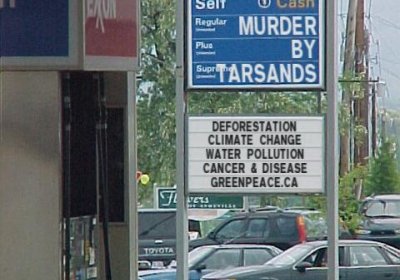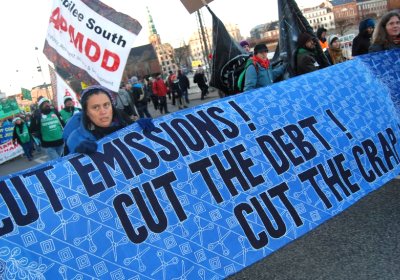As climate change compels us to reduce carbon emissions, urban gardens that provide locally produced food are becoming an increasingly important model. The African Food Project is an urban, organic farm that grows traditional African vegetables for the African community around the outer western suburb of Blacktown.
Environment
On June 25, federal trade minister Simon Crean signed a deal to export up to 20 million tonnes of dried brown coal to Vietnam. The deal was signed with ironically-named Victorian company Environmental Clean Technologies (ECT). Fifty people protested outside the venue in Southbank where the deal was signed, despite the rain and only a few hours notice of the event.
Organisers are expecting about 400 people to descend on Adelaide for the Students of Sustainability (SoS) conference over July 4 – 8.
The conference is held annually for students and activists involved in environment and social justice movements. Over the four days, workshops will be held on topics as diverse as climate change, guerrilla gardening, Indigenous rights, campaigning for renewable energy on campus and many more.
SoS gives participants the confidence, practical skills and motivation needed to campaign for a cleaner and healthier Earth.
Despite a promise before the last election, the Brumby state Labor government has introduced legislation to extend the urban growth boundary for Melbourne. Planning Amendment VC 67 expands Melbourne’s Urban Growth Boundary to accommodate the 284,000 houses the government expects will be needed if Melbourne’s population reaches 5 million before 2030.
About 70 people from the Green Wedge Coalition, Protectors of Public Lands and Planning Backlash protested against these plans on June 22.
In late June, two important events related to renewable energy took place.
On June 24, the Senate passed changes to the government's renewable energy target, removing the bias towards small-scale energy systems that put many wind farm projects on hold. The scheme set a 20% renewable energy target by 2020.
Newly installed Prime Minister Julia Gillard has offered a truce and fresh negotiations with the mining industry over the government's proposed Resources Super Profits Tax (RSPT).
Watching the industry's advertising campaign, you'd think the RSPT spelt the end of civilisation as we know it. According to one BHP Billiton ad, the RSPT will mean “fewer projects, jobs and opportunities for our future generations”. The ad's title, above an all-Australian image of young blokes playing footy, reads: “Australia loves to compete, but the Super Tax could take us out of the game.”
Muckaty Voices is a 10-minute video documentary that tells the story of the Muckaty traditional owners opposed to a radioactive waste dump on their country.
Traditional Owner Dianne Stokes said: “We made the video throughout the Warlmanpa land. It is all of the Milwayi story. Along with that, we have some songs and dances to represent the country.
“Martin Ferguson has avoided us and ignored our letters, but he knows very well how we feel. He has been arrogant and secretive and he thinks he has gotten away with his plan, but in fact he has a big fight on his hands.”
Attempts by Tahmoor mineworkers to negotiate with mining giant Xstrata have collapsed yet again after the company refused to budge during mediated talks in May. For 20 months, the Construction, Forestry, Mining, Energy Union (CFMEU), has been trying to negotiate an agreement.
British Petroleum (BP) has admitted it may not stop the Deepwater Horizon oil spill in the Gulf of Mexico until August — at the earliest. But despite the catastrophe, the US government’s Minerals Management Service (MMS) has given BP new leases for deepwater drilling.
The MMS has rubber-stamped 198 new deepwater drilling leases in the gulf since the BP spill began on April 20. It awarded BP 13 of these.
The tar sands mining project in Alberta, Canada, is possibly the largest industrial project in human history and critics claim it could also be the most destructive.
The mining procedure for extracting oil from a region referred to as the "tar sands," located north of Edmonton, releases at least three times the CO2 emissions of regular oil production procedures and will likely become North America's single largest industrial contributor to climate change.
Multinational oil companies in Nigeria spill more oil every year than has been spilled by BP in the Gulf of Mexico. Unlike the gulf disaster, most people are unaware of this ecological crime.
There have been major spills in Nigeria since BP’s Deepwater Horizon rig exploded on April 20, but they have received hardly any attention from the international media.
A May 12 explosion at a Shell installation turned 39 hectares of the Niger Delta into an oil slick, BBC News said on June 15.
Two weeks earlier, an Exxon Mobil oil pipeline ruptured. It spewed a million litres a day for a week.
On June 11 at the close of climate talks in Bonn, Germany, UN climate chief Yvo de Boer tried to put a positive spin on the outcome. “This all in all is a big step forward making much more possible in Cancun”, he said, referring to the next big climate conference that takes place in Mexico in November.
However, big step or not, the conference outcomes kept the world sprinting headlong towards a climate catastrophe.
- Previous page
- Page 288
- Next page






